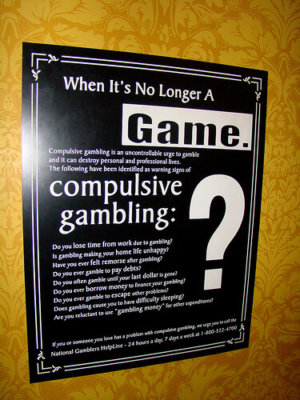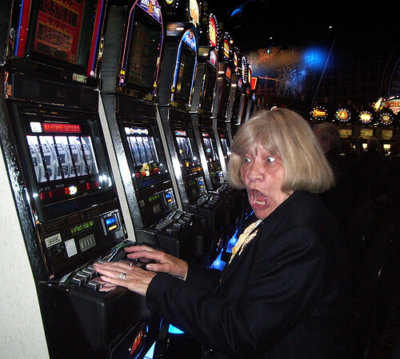Compulsive Gambling Habit? You Might Also Have a Personality Disorder

By: istolethetv
An occasional visit to a casino or betting house, or a casual game of online poker, can be harmless fun for some. For others, it can turn into a life-destroying habit.
And research shows that if you have a personality disorder, you are far more likely to fall into the latter category, with compulsive gambling and personality disorders being found to be a dangerous combination.
What is a Personality Disorder?
A personality disorder is when your personality is outside of the ‘norm’, so the ways that you think, feel, and act constantly cause you problems. This is especially so in your relationships, where others who may see you as difficult.
We of course all have many sides to our personalities, and it’s normal to act differently around certain groups of people and to not get along with everyone you meet.
If you have a personality disorder, though, you will consistently experience difficulties and the behaviours that cause you trouble will be consistent and part of your personality since at least young adulthood.
[For more information, read our comprehensive Guide to Personality Disorders].
What is a Gambling Addiction?
Like any addiction, what makes compulsive gambling, also called ‘pathological gambling’, an addiction and not just a fun habit, is that compulsive gambling feels impossible to control and you will do it even if it is having negative affects on your life.

By: Bev Wagar
Signs of a gambling addiction include:
- Increasing the amount of time and money you spend on gambling
- Being secretive about how much you are gambling
- Gambling even when you don’t have the money
- Gambling in a way that causes your loved ones to be concerned and worried
[For more information, read our piece on gambling addiction and counselling, or read our Guide to Addiction.]
Why would personality disorders and gambling be connected?
While it would not be accurate to suggest that personality disorders can “cause” gambling disorders, they can provide a psychological backdrop against which a gambling addiction can more easily develop.
This is in part because the factors that cause personality disorders are the same ones that can lead to addictions, including gambling addiction. These can include:
- hostile or stressful relationships with parents
- a history of exposure to child abuse
- an inability to control emotions
And these things, as well as leaving you prone to developing a personality disorder or addiction, also leave you vulnerable to the following:
- mood disorders (mainly depression)
- social isolation
- low self-esteem
- persistent feelings of pessimism, hopelessness and a lack of control over your fate.
And these things lead to wanting a distraction from inner pain, which of course gambling offers.
Research Connecting Gambling and Personality Disorders
In the October 2008 edition of the Journal of Psychiatric Research a team of scientists funded by the National Institute on Drug Abuse in the United States published the results of a study involving approximately 150 regular gamblers.

By: Chris Marchant
The Diagnostic and Statistical Manual of Mental Disorders (DSM) lists ten personality disorders you can fall under. These personality disorders are further broken down into three ‘categories’:
- Odd or Eccentric
- Dramatic, Emotional, or Erratic
- Anxious or Fearful
The rate of personality disorders among these gambling aficionados was measured at an impressive 20 percent, which is approximately four times higher than the percentage of individuals with personality disorders among the general population.
Cluster C disorders were more common than cluster A or B, with obsessive-compulsive disorder and avoidant personality disorder being prominent.
Even more interesting, about 60% of these regular gamblers then tested positive for problem or pathological gambling. And interestingly, in this group of gambling addicts, it was borderline personality disorder (BPD) that stood out as a real issue – 15% of this group exhibited BPD traits.
A more recent study carried out at Monash University in Australia (2014, results published in the Journal of Gambling Studies), also confirmed the Borderline Personality Disorder/pathological gambling link.
BPD is associated with high levels of impulsivity, making it not hard to understand why men and women with BDP might be especially prone to gambling dependency if they play games of chance on a regular basis.
Not that it’s safe to then gamble regularly if you don’t have BPD but another personality disorder – other studies have found measurable correlations between gambling and every single personality disorder barring three – dependent personality disorder, narcissistic personality disorder, and schizotypal personality disorder. Although these three disorders might not yet be connected due to lack of research or small sample sizes and are not proven to not be connected, either.
Getting help for your personality disorder and gambling
A personality disorder doesn’t define you. But it does play a strong role in shaping your daily reality, and it can make adapting to a variety of circumstances more challenging than it has to be. If you aren’t already seeking help for a suspected personality disorder, it’s a good idea to do so.
If you are already attending personality disorder counselling but have not shared your gambling issue with your therapist, remember that counsellors and psychotherapists expect their patients with personality disorders to encounter life difficulties. No matter what you tell them they are unlikely to react with surprise but rather with empathy and support.
Please know your personality disorder is not an obstacle to your recovery from your gambling problem, or from any other type of negative behaviour or thought pattern that has made your life more difficult. With expert, compassionate assistance you have just as good a chance as anyone else of overcoming a gambling addiction.
Do you have a story to share about gambling or having a personality disorder? Do so below.





Compulsive gambling can often be intertwined with personality disorders, making it essential to address both in treatment.